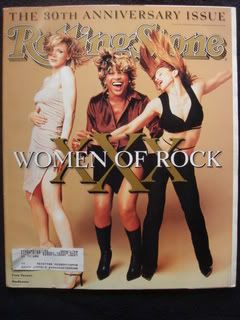 Anyone searching for proof that feminist analysis of pop culture is a thriving, necessary, and useful occupation need look no further than Bitch Magazine -- especially its Target Women: The Rise of the Sexist Media Stunt piece from earlier this year. In the piece author Jessica Wakeman looks at a very specific and deliberate type of mass media misogyny and gives it a name: she calls out articles that invent negative, anti-woman, anti-feminist trends as Sexist Media Stunts (SMS).
Anyone searching for proof that feminist analysis of pop culture is a thriving, necessary, and useful occupation need look no further than Bitch Magazine -- especially its Target Women: The Rise of the Sexist Media Stunt piece from earlier this year. In the piece author Jessica Wakeman looks at a very specific and deliberate type of mass media misogyny and gives it a name: she calls out articles that invent negative, anti-woman, anti-feminist trends as Sexist Media Stunts (SMS).
The SMS comes in many varieties, as Wakeman demonstrates; in addition to discussing the original "Is Feminism Dead?" SMS, she cites articles that question women's leadership capabilities and attack their sexuality, and pretend to be cutting edge in their un-p.c.-ness. The articles come from all kinds of mainstream publications, from women's magazines to national newsmagazines that allegedly have some sort of journalistic credibility.
They're not the only ones, though. Publications and websites on popular music are no strangers to the SMS, as anyone who has ever read Rolling Stone's annual women in rock issue knows. Music magazine SMSs are typically subtle -- rather than outright questioning women's place in the industry, they treat female artists and fans as The Other, continually emphasizing gender over artistic output and consumption. Sometimes they Otherize by being hostile towards female artists, and sometimes they Otherize by being apathetic or negligent towards female artists and fans. Sometimes they Otherize by appearing to embrace female artists, as with the Women in Rock issue, while refusing to acknowledge women as artists regardless of their sex or gender.

The most dangerous aspect of these stunts is how subtle and pervasive they are. If you're exposed to nothing but articles that normalize such disrespectful treatment of women musicians, why would you ever treat female artists -- or females in general (ZING!) with any kind of respect?
But then, that's the apparent purpose of all Sexist Media Stunts: to create a climate of hostility, meant to keep women 'in line', and to scare female and female-identified individuals away from speaking up, either in public or in their own lives. It's not 'just a magazine article', or 'just a headline', or 'just a bad review' -- it's a weapon of the patriarchy, and we have to learn to recognize it if we want to find a way to break it or use it against them.
No comments:
Post a Comment